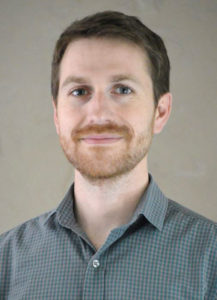Summer Fellowship Bridges Science and Entrepreneurship
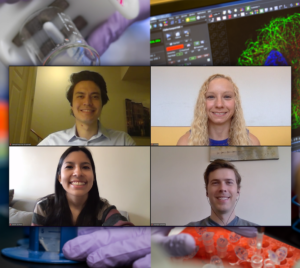 Four University of Washington graduate students put the hypothetical on hold for a summer to gain real-world experience with exciting new innovations. The students and their projects (detailed below) are part of the ITHS/WRF Summer Commercialization Fellowship Program hosted by the Foster School’s Buerk Center for Entrepreneurship. The program empowers MBA, Technology Entrepreneurship Certificate (TEC), and other Masters and PhD students to deliver solid business and market assessments on projects with commercial potential out of research labs at UW or partnered with the University.
Four University of Washington graduate students put the hypothetical on hold for a summer to gain real-world experience with exciting new innovations. The students and their projects (detailed below) are part of the ITHS/WRF Summer Commercialization Fellowship Program hosted by the Foster School’s Buerk Center for Entrepreneurship. The program empowers MBA, Technology Entrepreneurship Certificate (TEC), and other Masters and PhD students to deliver solid business and market assessments on projects with commercial potential out of research labs at UW or partnered with the University.
“It may sound cliché, but science fiction is being turned into science fact at an incredible rate at UW and across our region,” said Buerk Center assistant director and Hollomon Health Innovation Challenge manager Jessica Roberto. “Our goal is to put students in a position to help these innovations find their place in the market so ultimately, lives can be changed, and additional research will be supported down the road.”
The students were selected after a competitive application process and are expected to put in a minimum of 30 hours a week. They are paid for their work. The 10-week Fellowship begins in mid-to-late June each year and wraps up in late August. The program is made possible because of support from the Institute of Translational Health Sciences (ITHS) and the Washington Research Foundation, and a partnership with UW CoMotion.
2020 FELLOWSHIP PROJECT – KIDNEY ORGANOIDS
What if you could successfully mimic real tissues and organs with stem cells? Turns out not only is that possible, but there are an almost limitless number of possibilities for applying that kind of innovation. Fifth year Bioengineering PhD student Nicole Zeinstra will help Dr. Benjamin ‘Beno’ Freedman in the department of Medicine on what are called kidney organoids. The mini-kidney structures can be engineered to potentially allow for the testing of treatments for a wide range of diseases.
“My project as a PhD student is to take stem cells and create miniature heart tissue to be used as a therapy for heart attack treatment. Dr. Freedman’s product is interesting because it’s very similar,” said Zeinstra. “I also think cellular therapy is going to be a huge issue in the future.”
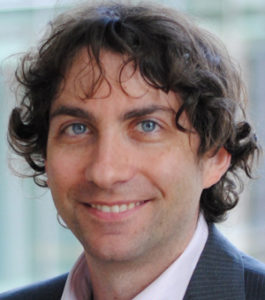
Fifth year Bioengineering PhD student Nicole Zeinstra will help Dr. Benjamin ‘Beno’ Freedman on what are called kidney organoids
Zeinstra aims to become a patent lawyer working specifically in technology commercialization. As a TEC student, she valued the chance to work with scientists and people from the business school. “With an opportunity like this I can get hands-on experience developing a company in a field I have knowledge and expertise in,” she said. “UW does an amazing job of bridging both science and entrepreneurship.”
In a normal summer, she says she’d be spending 10+ hours every day in the lab. “Having these stay at home orders really forced everyone to completely redo their entire routine,” she said. “For me, that meant learning a lot of things I couldn’t learn otherwise because I couldn’t spend every day in lab. So, I took extra classes and read extra things on the side about business.”
In addition to working towards a career as a patent lawyer, Zeinstra hopes to participate in an Ironman Triathlon event as soon as its safe to do so.
2020 COMMERCIALIZATION FELLOWSHIP PROJECT – HIV MEDICATION ADHERENCE
Over 50 million people could take a daily oral pill to prevent the acquisition of HIV if they are high-risk. However, the problem isn’t the pill (although expense is a concern). It’s being able to determine, as a patient, if you have enough of the drug in your system to protect you from exposure. An innovative test from a team led by Dr. Paul Drain of Global Health, Medicine, and Epidemiology might be the answer. Masters of Applied Bioengineering Student Samuel Broadwell will work with them to explore the potential market for such a test so they can find the best path to commercialization.
“I really enjoy the science aspect of it, but I also want to push through on the customer discovery and market analysis side of the project,” said Broadwell. “In classes, you do case studies and projects and its theoretical, but this is real.”
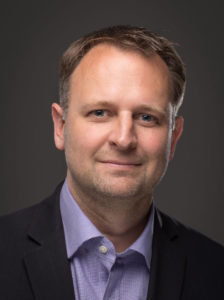
Masters of Applied Bioengineering Student Samuel Broadwell will work with a team led by Dr. Paul Drain
Broadwell learned about the Fellowship as a TEC student after continuing his education at UW. As an undergrad, he earned a degree in Chemical Engineering. By coincidence, the project he is now working on is the same one he learned about in a bioengineering seminar that featured some of Dr. Drain’s team.
“Pharmaceuticals have always really fascinated me and in that seminar, they talked about monitoring HIV drug adherence and I was very interested,” said Broadwell. “Now, to go beyond, and to be able to bridge the gap between engineering and business and make a product into reality—that really resonates with me.”
Broadwell previously participated on teams in the Dempsey Startup Competition, the Hollomon Health Innovation Challenge, as well as other case competitions at UW. “This Fellowship is an opportunity for me to tie together all I’ve learned and apply it.”
2020 COMMERCIALIZATION FELLOWSHIP PROJECT – CLEARING IMPLANTED CATHETERS
Modern medicine has allowed for newborns to enter the world safer than ever before. However, a small percentage are born with a life-threatening condition in which fluid accumulates in the brain. A catheter must be inserted through the skull to decrease the pressure. If that wasn’t scary enough, sometimes the catheters get clogged, causing pain, sickness, brain damage, or possibly death for the child. A new non-invasive approach to clearing those blockages hopes to become a gamechanger in treating that condition and possibly others. First-year MBA student Brendan Amland will work with Dr. Pierre Mourad of the department of neurological surgery, as well as Jason Hauptman from Seattle Children’s Hospital, to explore the pathways to make their innovation commercially successful.
“Some technologies have several applications that are possible, but I like that this one is very specific with a defined purpose,” said Amland. “This feels weighty and could have real-world applications. It’s not a paper. It’s not a school project. And it lines up well with what I want to do in the future.”
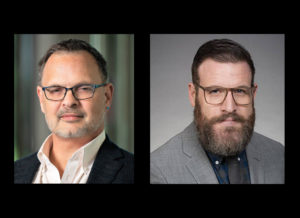
First-year MBA student Brendan Amland will work with Dr. Pierre Mourad (left) as well as Jason Hauptman (right) from Seattle Children’s Hospital
Amland wants to stay in the healthcare industry after finishing his MBA. It’s become a passion for him after a childhood and early adult life that’s featured a wide variety of experiences. As a child, Amland was a USDA tennis player. In college at the University of California-Santa Barbara, he majored in global and international studies. He’s taught English overseas in Korea and has worked in medical equipment sales. The latter left him hungry for the future. Meeting Dr. Morad left him excited for this summer.
“I’m going to get really close to where innovation and creativity happens at UW. It’s new material and new things I haven’t done, but I think that’s a good indicator of how much of a growth opportunity it is for me.”
2020 COMMERCIALIZATION FELLOWSHIP PROJECT – HOLOGRAPHIC ULTRASOUND
If a patient (or doctor) can avoid surgery, chances are, they will. That’s not always possible when it comes to treating things like tumors or even kidney stones. Ultrasound technology has previously been used to shrink tumors from outside the body with limited success. An innovation approach to this kind of therapy may eliminate the need for surgeries by focusing on improving the ultrasound beam itself. Fifth-year Biochemistry PhD student Sherry Bermeo will work on the best applications for turning this refined technology into a company with Dr. Adam Maxwell of the department of Urology and the Applied Physics Laboratory.
“I was interested in a project that had a clinical application because it is an opportunity to step outside my comfort zone,” said Bermeo. “Dr. Maxwell and his team have a lot of ideas and perspective on where they want to go. Converting that into a tangible product is going to be quite significant.”
Bermeo has been working in Dr. David Baker’s lab at the UW Institute for Protein Design creating brand-new proteins that don’t exist in nature. She also just finished the TEC program. Having grown up in New York, she finds the Seattle Biotech and startup scene fascinating.
“I’m interested in learning how (startup launches) work here in Seattle and taking those skills and translating them to other cities, like New York,” said Bermeo. “It feels like a win-win opportunity to bridge different perspectives.”
Bermeo also feels fortunate to have the Fellowship and her graduate studies during these uncertain times. “One of the most interesting things you can do as a human being is put yourself into a position where you have to adapt. I feel very lucky to be able to still learn, and still have a job, in the midst of a pandemic.”
FELLOWSHIP ALUMS SHARE ADVICE FOR THE NEW COHORT
The ITHS/WRF Summer Commercialization Fellowship Program has paid huge dividends for alumni. Shivani Ludwig (PhD Bioengineering ’17) and Sabrina Kamran (PhD Philosophy and Pharmacology ’19) credit the program with teaching them skills in evaluating technology and communicating the potential in a non-scientific way.
“You learn how to have just enough of that science hat on, but also when to take it off, and talk to a varied audience,” said Ludwig, who now works as a healthcare program manager at Amazon Web Services. “There was also a heavy focus on presentation skills which is also really important for any job you have.”
“It has definitely helped in my current role now,” said Kamran, who works at Ximbio in Boston helping universities and non-profits manage technology transfer of their research materials and creations. “I did the program the summer before I defended my PhD. It was so valuable to have that experience so close to graduating and entering the workforce. I wouldn’t be as comfortable had I not had that experience thinking about markets and problems.”
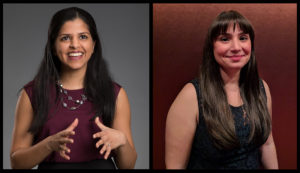
Shivani Ludwig (PhD Bioengineering ’17, left) and Sabrina Kamran (PhD Philosophy and Pharmacology ’19, right) credit the Fellowship program with teaching them skills in evaluating and communicating about technology in a non-scientific way
Both Ludwig and Kamran say they are proud to have the Fellowship listed on their LinkedIn profiles alongside their individual UW experiences in things like the TEC program, student competitions, and student organizations. They remember what it was like to be a graduate student and a Fellow and wanted to share some advice for the 2020 (and future) cohorts.
“The program is going to make 10 weeks go by quickly. Work with your team and the rest of the cohort,” said Ludwig. “Be a sponge as you’re executing, writing, and planning. And be sure to have meetings and be open and willing to learn the technology of the scientists.”
Kamran added that it’s okay to feel overwhelmed by the possibilities of the technology. “Really just focus on one application and decide if it’s going to be a go or a no-go,” she said. “And when you are in week four doing evaluations, get help with that! I personally found financial modeling really difficult.”
Both are quick to encourage other students to consider the Fellowship program in the years to come. “Science backgrounds need to engage in this kind of thinking and problem solving, it’s so important,” said Kamran. “You have to be able to think this way if you enter into a career on this side of things.”
Ludwig added, “If you’re looking for a way to dip out of the purely technical, super-specialized place you’re in as a graduate student, this is the way to do that. It doesn’t remove you from your environment either. It allows you to connect the dots of what you’re already doing.”
The 2020 cohort will wrap up in late August. More details can be found on startup.uw.edu about the Commercialization Fellowship as well as other fellowships. The Buerk Center also partners with Population Health, the Evans School of Public Policy & Governance, and CoMotion on the Social Entrepreneurship Fellowship program, which launched in 2019. You can learn more about those fellows and their projects on the Population Health website or by clicking on the article link here.
# # #

